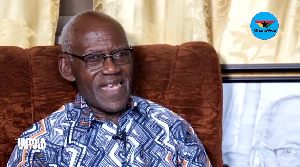- Home - News
- TWI News | TV
- Polls
- Year In Review
- News Archive
- Crime & Punishment
- Politics
- Regional
- Editorial
- Health
- Ghanaians Abroad
- Tabloid
- Africa
- Religion
- Election 2020
- Coronavirus
- News Videos | TV
- Photo Archives
- News Headlines
- Press Release
General News of Monday, 14 May 2007
Source: peter n. jeffrey
CPP to set up Energy Consulting Committee.
For a developing country like Ghana to achieve her true potential, energy becomes a fundamental requirement without which she cannot develop. Energy can transform communities and help indigenous industries to thrive. The case of Kumasi Magazine, a large slum industrial town which is situated outskirts of Ghana’s second city, Kumasi, is one classic example. The artisans of Kumasi Magazine use a combination of modern and primitive technology to produce various products, ranging from vehicle spare parts to cooking stoves, lantern and others.
Commenting on the case of Kumasi Magazine, Professor Agyeman Badu Akosa, a leading member of the CPP stated, “Where communities seek options for energy supply, we will help them to develop and promote sustainable energy technologies”. Akosa said the artisans of Magazine industrial slum would be encourage to participate in designing, building and maintaining the project such as wind powered solar energy. Akosa said this can be used by thousands of off-grid households to light their homes. Akosa, who was upset about the current energy crisis facing his homeland said access to energy options that he has outlined would bring greater income, better education for children who can studied in lighted home, access to public goods like information through radio and television, lighting for community centres and power for cottage industries.
Akosa further stated that the Engineering departments of universities and polytechnics up and down the country can support the artisans by bringing technical improvements in their products, such as, by developing and commercialising low cost cooking stoves to improve upon the traditional three stone cooking fires.
Akosa stated that energy situation in Ghana is getting to a crisis point where a concerted action needs to be taken to address this before the country descend into total darkness. He emphatically stated that without intervention the crisis can push Ghana’s development back a decade. In the light of this, he stated that the CPP are going to set up a high powered Energy Consulting and Review committee, a multi-Stakeholder team to look at energy options like solar electricity to rural electrification.
Professor Akosa said the energy crisis is affecting Ghana’s human development as schools, hospitals, businesses and computer networks all rely on electricity. He said Ghana cannot reduce poverty without investing substantially in energy and explained that you cannot have water provision, education or health without energy.
The CPP are going to develop a knowledge based economy which will focus on science, technology and indigenous industry. Professor Akosa said the need for workers to acquire a range of skills is imperative in order for them to adapt the changes in the global economy, especially if Ghana is to benefit from the large off shore jobs that is currently going to countries in Asia. Professor Akosa said employment in knowledge-based economy demands highly skill workers and emphasised that Ghana can position her self to become the best performing economy in sub-Saharan Africa to rival only South Africa by investing more in research and development. Professor Akosa said for Ghana to become a middle income country, she must be able to feed herself without relying on food aid or imported food from other countries. He explained the CPP in the first 4 years in government will invest more in agriculture. Akosa stated that rice production in northern Ghana would be given priority to enable Ghana become a leading producer of rice in the sub region.
The CPP, Professor Akosa stated will establish a framework to invest in Ghana’s future as the Nkrumah government did instead of relying on our colonial masters and other donors to point the way forward for Ghana.
High energy cost can deter investment in the country. In a study on firms operating in Uganda, Reinikka and Svenson (1999) explained that electric power is available on average only 60% of the time; hence costs of operation are much higher as they need be and private investment gets diverted into purchase of generators. This makes firms equipment investment rates 50% higher than countries with high output of electricity and thus affects production. The Ugandan situation is not unique to Ghana, and this Professor Akosa stated the CPP wants to change by investing in alternative energy. He stated that public investment is complimentary to private investment and said in the first 4 years of the CPP administration investment in infrastructure and energy will have urgent attention.
The CPP wants to limit Ghana’s dependency on aid. As such, Akosa explains that rapid growth rate reduces poverty which in turn reduces justification for aid, thus it is imperative for the country to establish a good reputation with investors to enable private capital flows plus public investment to sustain this growth. Akosa explained that Ghana needs to sustain a growth rate of 7-10% between now to 2015 if Ghana is to achieve middle income status. Akosa said Ghana’s overdependence on aid is hampering the country’s progress.
Ghana’s exports is concentrated on small group of commodities the prices of which are volatile on the world market, examples are cocoa and gold. Hence it is the party’s aim to diversify from the over reliance on this narrow range of commodities to other areas. Energy plays an important part if this diversification is to become successful.
Professor Akosa noted that many Ghanaians entered the 21st century unable to read a book or write their name and explained that since 1966, the investment rate in the country continues to decline, leaving over 70% of the people in abject poverty. He stated that this cannot continue, hence the reason the CPP must be voted to into power to restructure the economy and prepare the country for a take off. Akosa said the take off would demand huge investment in human and capital infrastructure. He said development will be spread evenly and every region would be encouraged to take advantage of areas where they have comparative advantage. Akosa said every region would have an export zone.
Professor Akosa said establishing a University of Agriculture in the country is long overdue but did not commit himself as to which region deserves to have this university.
Professor Akosa said the CPP will set up a policy committee in every sector of the economy and will consult widely to ensure the past mistakes never happened again. He explain that access to piped water into the household averages about 90% for the wealthiest 20% of the population, compared with 10% for the poorest 80%. This he stated the CPP will urgently address in their first 4 years in government. Professor Akosa who is the former boss of Ghana Health Service said it is unacceptable that women should spend several hours a day collecting water. He said the economic waste associated with water and sanitation deficit in Ghana is enormous, including cost associated with health spending, productivity losses and labour diversions.
In a speech he gave on the International Day for the Eradication of Poverty, 17TH October 2000, Kofi Anna, then the UN Secretary General said, “Almost half the world population lives on less than $2 a day, yet even this statistics fails to capture the humiliation, powerlessness and brutal hardships that is the daily lot of the world’s poor. In Ghana and the rest of the countries in sub-Saharan Africa the needless deaths of children is a great worry. At present sub-Saharan Africa accounts for 30% of total child deaths. According to Oxfam the figure will rise to 57% by 2015. Oxfam report stated that high levels of poverty and collapse of basic services are primarily responsible. Professor Akosa stated that if Dr Nkrumah’s 7 year development plan had been followed to the letter by past governments Ghana would have been on par with Botswana in developmental terms. Akosa said Vietnam; a country that went through a traumatic civil war has now overtaken Ghana and is a successful economy.
In the 3 northern regions in Ghana, the situation is stark. Two Thirds of children out of school are girls. The CPP wants to be the interest of the Ghanaians before self.
The Universal Declaration on Human Rights, states that "everyone has the right to a standard of living adequate for the health and well-being of himself and of his family, including food, clothing, housing and medical care and necessary social services". But for most of humanity, these rights are increasingly inaccessible. In Ghana today many children go to bed with no food. Professor Akosa said the children of Ghana deserve better, the marginalised deserves better, Ghana deserves better.
Akosa said the CPP recognise the role of the Diaspora in Ghana’s development. He said the Diaspora group and those at home have common interest in the development of the homeland. Professor Akosa said as Ghana moves forward the Diaspora is well placed to help accelerate growth and development. He said the CPP would establish focal points for the Diaspora within government departments for interaction between the policy makers and the Diaspora. Professor Akosa said CPP government will afford the Diaspora a region status and stated that they will invite and encourage full participation of the Diaspora as an important part of our country. He said the case of “them” and “us” will be banished to the dustbin of history. The eradication of poverty in the homeland demands all hands on deck. The Diaspora possesses a multitude of intellectual, economic and political resources, through which it can make huge contribution to poverty reduction home.
Professor Akosa said the energy crisis confronting the homeland would have been resolved had the Diaspora been made partners in the development of the homeland. He cited the case of the Ghanaian Doctors and Dentists Association as a case in point. He said they can make contribution either through short-term placements, sharing research findings or cooperation projects with their counter parts home. He said the CPP would encourage the Diaspora and their counter parts home to set up think tanks around scientific, economic and social issues to contribute public policy problem solving. Professor Akosa said the Vietnam Diaspora scientists have contributed significantly to the development of their country. He said the CPP will invoke “Patriotism” and the love of country to encourage all to participate in the development of our motherland. He said the health and education sector have become vulnerable due to the continuing brain drain of large number of workers from the 2 sectors, and directly appealed to his compatriots to support their efforts to develop the country. Professor Akosa acknowledges that it is unrealistic to expect the health and education skilled workers to permanently return home but they can make tremendous contributions to their sectors in Ghana.
Again using the health sector as classic example, Professor Akosa said most of the Ghanaian doctors and dentists in Diaspora passed through University of Ghana and Kwame Nkrumah University of Science and Technology medical schools hence they can be instrumental in mobilising resources and supply of expertise for the medical schools, including the new medical school at University of Cape Coast.
Professor Akosa acknowledges that the large remittances from the Diaspora is playing an important role in poverty reduction, not through the traditional uses of increasing household purchasing power for essential goods such food, education, health care and housing, but also bolstering the country’s foreign exchange. However Akosa wants the Diaspora contributions to go beyond remittances to areas such as investment in major infrastructure and other projects and organisations. Akosa cited areas such as roads, telecommunications, air transport, financial institutions, railroad, agriculture and others. Professor Akosa, sounding very emotional, appeals to the Diasporas to seriously consider the very survival of the homeland and pleaded with come and contribute their quota. He quoted the great Ghanaian proverb, “There is nowhere better than home” and said the CPP will organise a major “Home Coming” summit for the Diaspora.










